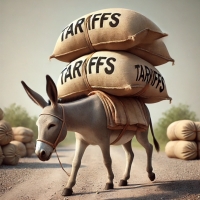What’s happening in the U.S. might soon hit close to home! Trump tariffs could soon play a surprising role in your real estate plans.
With rising global trade tensions, especially between the U.S. and its key trading partners, some experts are warning that Donald Trump’s latest tariff proposals could ripple across the border, affecting everything from building materials to consumer goods in Canada. Here’s what GTA home buyers, sellers, and investors should watch for – and how it could shape your real estate decisions in 2025.
What Are Trump Tariffs, and Why April 2 Matters
Donald Trump has proposed a fresh round of import tariffs that may take effect on April 2, 2025. These Trump tariffs are aimed at goods from Canada, Mexico, and China — countries that account for over 40% of total U.S. imports.
Although the original proposal sounded aggressive (including 25% tariffs on all imports), Trump has since hinted at a softer approach. Sector-specific tariffs like those on lumber, cars, and electronics may be delayed or come with exceptions. Still, the term “Trump Tariffs” has once again taken over economic headlines, with potential ripple effects across Canadian markets.
How Trump Tariffs Could Affect the GTA Housing Market
Trump tariffs may raise the cost of imported materials such as lumber, steel, and home appliances. That could affect both builders and renovators in the Greater Toronto Area.
Here’s what that could mean for you:
• Renovation Budgets May Increase – Homeowners planning to upgrade should consider locking in prices before April 2.
• Inventory May Tighten – If construction slows due to material costs, buyers could face limited options later in the year.
• Early Buyers May Benefit – Making a move before tariffs fully roll out could save money and avoid future price hikes.
While these potential changes might sound negative, they also create windows of opportunity for well-prepared buyers and investors. Trump’s strategy has often been to present a worst-case scenario — then scale it back slightly to seem more reasonable. Economists call this “selling a 10 and delivering a 6.” While the actual tariffs may be less extreme than first proposed, they still have real economic effects.
A few examples:
• Steel and aluminum tariffs from China remain at 25%, raising costs for infrastructure and manufacturing.
• General tariffs on Chinese goods sit at 20%, impacting electronics, tools, and other everyday items.
• USMCA updates now apply 25% tariffs on some Canadian and Mexican goods, if they don’t meet treaty rules.
What About the GTA Real Estate Market?
GTA homes remain a strong, stable investment - even in uncertain global climates. If tariffs do raise costs on imports, it may affect renovation materials or certain goods. In fact, Canadian real estate is often seen as a safe haven for investors during times of economic unpredictability. Well-priced homes continue to attract serious interest.
Final Thoughts: Stay Informed, Stay Ahead
Whether you’re buying, selling, or investing, it’s important to stay ahead of the trends – not just in local real estate, but in the global economy that shapes it. Tariffs might seem like political theater from afar, but they can quickly turn into added costs on the homes we live in and the investments we make.




Post a comment